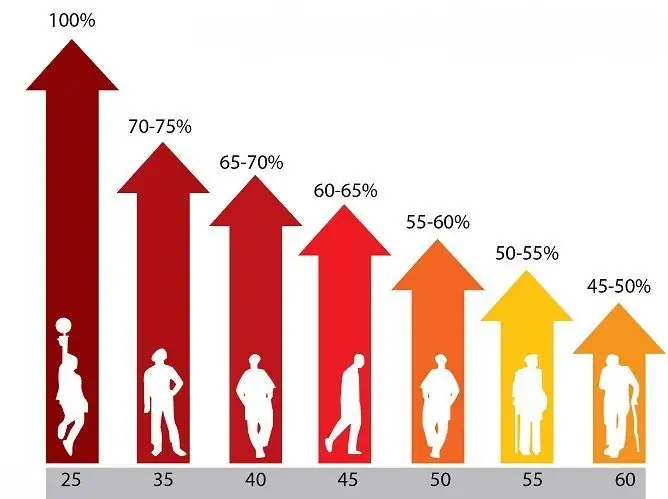- Author Rachel Wainwright wainwright@abchealthonline.com.
- Public 2023-12-15 07:39.
- Last modified 2025-11-02 20:14.
Parathyroid hormone and its functions in the body
The content of the article:
- Where is it produced
- What functions does it perform in the body
-
Laboratory research for PTH
- Indications for analysis
- Study preparation rules
- Parathyroid hormone rates in women and men
-
Reasons for deviation of PTH from the norm
- Enhancement
- Decline
- Video
Parathyroid hormone (PTH, PTH, parathyroid hormone, parathyrin; in the information space there are also erroneous names - "parathyroid hormone", "parathyroid hormone") is a biologically active substance that is produced by the parathyroid (parathyroid) glands and is a single-chain peptide by chemical structure.

Parathyrin, or parathyroid hormone - the main regulator of calcium, the most important substance in the life of the body
Where is it produced
The bioprecursor of this substance is proparathyroid hormone, which is produced by the main cells of the parathyroid gland, has a lower biological activity and is converted into parathyroid hormone during proteolytic cleavage in the Golgi complex. The antagonist of parathyroid hormone is calcitonin, which is produced by C-cells of the thyroid gland.
Parathyroid hormone levels can be influenced by the level of calcium, magnesium, phosphorus and vitamin D in the body. So, with an increase in the level of calcium in the blood, the secretion of parathyroid hormone decreases, and with a decrease, it increases, which allows maintaining a stable level of calcium in the blood.
What functions does it perform in the body
Parathyroid hormone plays an important role in the regulation of calcium and phosphorus metabolism. The hormone acts by binding to specific PTH receptors that are located on the surface of cells. The main biologically active form of the substance is intact parathyroid hormone, consisting of 84 amino acids.
Functions of parathyroid hormone in the body:
- Inhibits the formation of bone tissue by acting on osteocytes and osteoblasts, which, in turn, produce cytokines and insulin-like growth factor 1, which activate osteoclasts. The latter secrete collagenase and alkaline phosphatase, which degrade the bone matrix.
- Participates in increasing the reabsorption of calcium in the renal tubules.
- Stimulates the synthesis of calcitriol, which increases the absorption of calcium in the small intestine, and also regulates the excretion of phosphate by the kidneys.
- Responsible for maintaining a stable level of calcium and phosphorus in the extracellular fluid.
Laboratory research for PTH
In addition to the analysis for parathyrin, the patient, as a rule, is assigned to determine the content of ionized calcium in the blood, the concentration of the hormone is evaluated along with this indicator.
The purpose of the analysis and the decoding of the result obtained is made by the doctor, who will explain what the level of a particular indicator can mean in a particular case, and, if necessary, will prescribe treatment.
Indications for analysis
A study for parathyroid hormone is prescribed:
- in order to assess the work of the parathyroid glands;
- to determine the causes of calcium metabolism disorders and monitor patients with this pathology;
- for the diagnosis of hypoparathyroidism;
- during the differential diagnosis of primary, secondary and tertiary hyperparathyroidism;
- to assess the effectiveness of the treatment of diseases of the parathyroid glands.
An indication for research may be:
- increase or decrease in the concentration of calcium in the blood;
- accompanying symptoms of calcium metabolism disorders (abdominal pain, thirst, nausea, cramps, tingling in the fingers);
- osteoporosis;
- chronic kidney disease, in which there is a decrease in the glomerular filtration rate;
- surgical operations in the neck area;
- increased neuromuscular excitability;
- multiple caries;
- cholelithiasis;
- relapses of gastric ulcer and 12 duodenal ulcer.
Study preparation rules
You need to properly prepare for the analysis for parathyrin:
- During the day, you should exclude the use of alcoholic beverages, stop taking medications that can affect the indicators (after agreement with the doctor).
- On the eve of the analysis, exclude intense physical activity, excessive mental stress. Ensure complete rest before taking blood.
- Smoking should be stopped 3 hours before blood sampling.
- It is recommended to donate blood in the morning on an empty stomach (at least 12 hours after the last meal), best around 08:00.
Some drugs, the introduction of a radioisotope preparation for 1 week before the laboratory test can distort the test result. Estrogens, phosphates, anticonvulsants, antituberculosis drugs can increase the level of parathyroid hormone, and oral contraceptives, antibacterial drugs, vitamin D can reduce.
Parathyroid hormone rates in women and men
Parathyroid hormone levels change with the time of day. So, the maximum content of this substance in the blood is noted at 14: 00-16: 00, a decrease to the basal level occurs by 08:00.
Normal values are shown in the table.
| Patient group | Reference values, pg / ml |
| Women under 20 | 12-95 |
| Women 20-70 years old | 9.5-75 |
| Women over 70 | 4.7-117 |
| Men under 22 | 12-95 |
| Men 22-70 years old | 9.5-75 |
| Men over 70 | 4.7-117 |
Different laboratories may use different methods of determining the level of PTH, norms and units of measurement. Therefore, if it is necessary to repeatedly determine the concentration of parathyroid hormone in the blood, it is recommended to take tests in the same medical institution.
Reasons for deviation of PTH from the norm
Enhancement
An increased concentration of parathyroid hormone is detected in the following conditions:
- decreased blood calcium levels;
- hyperparathyroidism;
- Albright's disease (pseudohypoparathyroidism);
- rickets;
- bone metastases;
- chronic renal failure;
- ulcerogenic adenoma of the pancreas;
- multiple endocrine neoplasia.
Elevated levels of parathyrin can be detected in women during pregnancy and breastfeeding.
Decline
A decrease in the concentration of parathyroid hormone occurs in the following cases:
- hypercalcemia;
- hypoparathyroidism;
- excess in the body of vitamins A, D;
- autoimmune pathologies in which autoantibodies to calcium receptors are formed in the body;
- severe form of thyrotoxicosis;
- hepatocerebral dystrophy;
- sarcoidosis;
- multiple myeloma;
- lack of magnesium in the body.
Video
We offer for viewing a video on the topic of the article.

Anna Aksenova Medical journalist About the author
Education: 2004-2007 "First Kiev Medical College" specialty "Laboratory Diagnostics".
Found a mistake in the text? Select it and press Ctrl + Enter.






